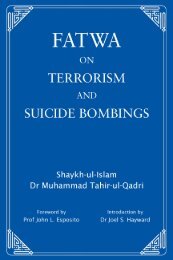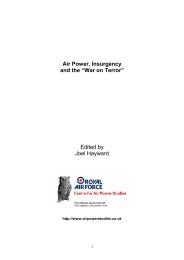Air Power, Insurgency and the âWar on Terrorâ - Prof. Joel Hayward's ...
Air Power, Insurgency and the âWar on Terrorâ - Prof. Joel Hayward's ...
Air Power, Insurgency and the âWar on Terrorâ - Prof. Joel Hayward's ...
You also want an ePaper? Increase the reach of your titles
YUMPU automatically turns print PDFs into web optimized ePapers that Google loves.
Unnecessary or Unsung? The Strategic Role of <str<strong>on</strong>g>Air</str<strong>on</strong>g> <str<strong>on</strong>g>Power</str<strong>on</strong>g> in Britain’s Col<strong>on</strong>ial Counter-Insurgencies<br />
was an acknowledgement <strong>on</strong> behalf of <str<strong>on</strong>g>the</str<strong>on</strong>g> <str<strong>on</strong>g>Air</str<strong>on</strong>g> Ministry of <str<strong>on</strong>g>the</str<strong>on</strong>g> political implicati<strong>on</strong>s of air<br />
power if used want<strong>on</strong>ly. In December 1953 <str<strong>on</strong>g>the</str<strong>on</strong>g> <str<strong>on</strong>g>Air</str<strong>on</strong>g> Ministry warned <str<strong>on</strong>g>the</str<strong>on</strong>g> Headquarters<br />
of <str<strong>on</strong>g>the</str<strong>on</strong>g> Middle East <str<strong>on</strong>g>Air</str<strong>on</strong>g> Force that: “Use of medium bombers in Mau Mau operati<strong>on</strong>s is<br />
political dynamite”. 146 Therefore <str<strong>on</strong>g>the</str<strong>on</strong>g> applicati<strong>on</strong> of direct offensive air power in Kenya was<br />
minimised, not <strong>on</strong>ly for political reas<strong>on</strong>s. We must c<strong>on</strong>sider that <str<strong>on</strong>g>the</str<strong>on</strong>g> area of operati<strong>on</strong>s in<br />
Kenya was much more c<strong>on</strong>stricted than in Malaya, given <str<strong>on</strong>g>the</str<strong>on</strong>g> geographically c<strong>on</strong>fined<br />
nature of <str<strong>on</strong>g>the</str<strong>on</strong>g> Mau Mau’s str<strong>on</strong>gholds, as opposed to <str<strong>on</strong>g>the</str<strong>on</strong>g> MRLA’s nati<strong>on</strong>wide presence.<br />
This ensured that any aerial bombardment would have to take place with <str<strong>on</strong>g>the</str<strong>on</strong>g> inevitable<br />
knowledge of <str<strong>on</strong>g>the</str<strong>on</strong>g> civilian community who lived close to <str<strong>on</strong>g>the</str<strong>on</strong>g> insurgent c<strong>on</strong>trolled areas,<br />
drastically undermining <str<strong>on</strong>g>the</str<strong>on</strong>g> strategic imperative of harnessing indigenous support for <str<strong>on</strong>g>the</str<strong>on</strong>g><br />
counter-insurgency campaign.<br />
This raises broader psychological aspects pertaining to <str<strong>on</strong>g>the</str<strong>on</strong>g> use of air power in counterinsurgency,<br />
mainly <str<strong>on</strong>g>the</str<strong>on</strong>g> satisfacti<strong>on</strong> generated within <str<strong>on</strong>g>the</str<strong>on</strong>g> civilian populati<strong>on</strong> from merely<br />
seeing aeroplanes in <str<strong>on</strong>g>the</str<strong>on</strong>g> sky which fosters a feeling that something is being d<strong>on</strong>e,<br />
whe<str<strong>on</strong>g>the</str<strong>on</strong>g>r or not it is actually having a tangible result <strong>on</strong> <str<strong>on</strong>g>the</str<strong>on</strong>g> outcome of counter-insurgency<br />
operati<strong>on</strong>s. Fur<str<strong>on</strong>g>the</str<strong>on</strong>g>rmore, despite <str<strong>on</strong>g>the</str<strong>on</strong>g> use of aerial bombardment to herd forest-bound<br />
guerrillas towards awaiting security force patrols, it was estimated that during <str<strong>on</strong>g>the</str<strong>on</strong>g> Kenyan<br />
Emergency it took <strong>on</strong>e t<strong>on</strong>ne of bombs to kill just <strong>on</strong>e insurgent. 147 Yet we must bear in<br />
mind that <str<strong>on</strong>g>the</str<strong>on</strong>g> strategic applicati<strong>on</strong> of air power in Kenya was narrower than in Malaya. The<br />
stated purpose of air power was “to drive <str<strong>on</strong>g>the</str<strong>on</strong>g> terrorists out of <str<strong>on</strong>g>the</str<strong>on</strong>g> forests … in c<strong>on</strong>juncti<strong>on</strong><br />
with ground operati<strong>on</strong>s.” 148 If we apply this strategic remit to air power, it can be seen as a<br />
relative success, especially given that analysis by <str<strong>on</strong>g>the</str<strong>on</strong>g> security forces in mid-1954 revealed<br />
that a significant proporti<strong>on</strong> of surrendered Mau Mau gave fear of aerial attack as <strong>on</strong>e of<br />
<str<strong>on</strong>g>the</str<strong>on</strong>g> prime factors motivating <str<strong>on</strong>g>the</str<strong>on</strong>g>ir capitulati<strong>on</strong>. 149<br />
In comparis<strong>on</strong> to Malaya, very little sec<strong>on</strong>dary literature has actually been written <strong>on</strong> air<br />
operati<strong>on</strong>s in Kenya. Although this is partially underst<str<strong>on</strong>g>and</str<strong>on</strong>g>able given <str<strong>on</strong>g>the</str<strong>on</strong>g> relative paucity<br />
of missi<strong>on</strong>s undertaken by <str<strong>on</strong>g>the</str<strong>on</strong>g> RAF in order to quell <str<strong>on</strong>g>the</str<strong>on</strong>g> Mau Mau in c<strong>on</strong>trast to Malaya,<br />
it is surprising that wider analysis has not been forthcoming, especially given <str<strong>on</strong>g>the</str<strong>on</strong>g> logistical<br />
<str<strong>on</strong>g>and</str<strong>on</strong>g> strategic c<strong>on</strong>undrum posed by <str<strong>on</strong>g>the</str<strong>on</strong>g> need to maintain supplies to ground troops in a<br />
c<strong>on</strong>fined area of operati<strong>on</strong>s without revealing <str<strong>on</strong>g>the</str<strong>on</strong>g>ir positi<strong>on</strong> to <str<strong>on</strong>g>the</str<strong>on</strong>g> enemy. In perhaps<br />
<str<strong>on</strong>g>the</str<strong>on</strong>g> <strong>on</strong>ly sustained evaluati<strong>on</strong> of <str<strong>on</strong>g>the</str<strong>on</strong>g> Kenyan air campaign, written over thirty years ago,<br />
Alan Waters, a police officer during <str<strong>on</strong>g>the</str<strong>on</strong>g> Mau Mau uprising who later turned to academia,<br />
offers a scathing analysis of both <str<strong>on</strong>g>the</str<strong>on</strong>g> direct <str<strong>on</strong>g>and</str<strong>on</strong>g> indirect use of air power in Kenya. Waters<br />
provides a wi<str<strong>on</strong>g>the</str<strong>on</strong>g>ring critique of aerial bombing of Mau Mau camps in <str<strong>on</strong>g>the</str<strong>on</strong>g> forests, arguing<br />
that it was a “futile <str<strong>on</strong>g>and</str<strong>on</strong>g> counter-productive exercise … (that) gave <str<strong>on</strong>g>the</str<strong>on</strong>g> gangs a feeling<br />
that <str<strong>on</strong>g>the</str<strong>on</strong>g>y were not <strong>on</strong>ly very important, but that <str<strong>on</strong>g>the</str<strong>on</strong>g>y were winning every time <str<strong>on</strong>g>the</str<strong>on</strong>g>y<br />
survived.” 150 Yet it was not just direct air power that Waters felt was ineffective. He claims<br />
76<br />
<str<strong>on</strong>g>Air</str<strong>on</strong>g> <str<strong>on</strong>g>Power</str<strong>on</strong>g>, <str<strong>on</strong>g>Insurgency</str<strong>on</strong>g> <str<strong>on</strong>g>and</str<strong>on</strong>g> <str<strong>on</strong>g>the</str<strong>on</strong>g> “War <strong>on</strong> Terror”





